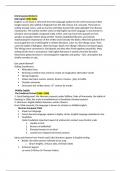Literatuurgeschiedenis
Old English (500-1066)
English, as we know it, descends from the language spoken by the north Germanic tribes
(Anglo Saxons) who settled in England from the 5th century A.D. onwards. They had no
writing (except runes, used as charms) until they learned the Latin alphabet from Roman
missionaries. The earliest written works in Old English (as their language is now known to
scholars) were probably composed orally at first, and may have been passed on from
speaker to speaker before being written. Monks established libraries and schools,
emphasizing the importance of the written word (mostly the bible). Alfred the greatest first
encouraged the use of Old English in written literature. Later on, the Vikings came. Then
came the battle of Edington. After the kings’ death, the Vikings’ influence increased again.
The Vikings were converted to Christianity and they then lived together peacefully. Most
writing of this time is anonymous. Old English literature is mostly chronicle (kroniek;
historische gebeurtenissen in chronologische volgorde) and poetry - lyric, descriptive but
chiefly narrative or epic.
Epic poem Beowulf
Setting Scandinavia
Alliterative lines
Kennings (combine two words to create an imaginative alternative word)
Strong imaginary
Values Germanic warrior society, bravery, honour , glory in battle
Christian elements
Oral poem but written down 11th century by monks
Middle English
The Medieval Period (1066- 1500)
1. Social background: the Norman conquest under William, Duke of Normandy, the battle of
Hastings in 1066; the mark of establishment of feudalism (feodaal system).
2. Literature: English Ballad; Romance; writer Chaucer
From 1066 onwards, the language is known to scholars as Middle English.
Norman Conquest 1066
Impact on language
French became language spoken in higher circles. English language exploded in size.
Feudalism
Under feudalism important aspect of aristocratic conduct was chivalric code
1. Loyalty to lord
2. Bravery in battlefield
3. Elevated women to an ideal
4. courtly love (replaced Germanic poetry)
Ideas and themes from French and Celtic literature appear in English writing
Balads: Narrative poems indented to be sung
o (brave knights, virtuous lady, Christian ideal)
Arthurian legend
Le morte D Árthur Sir Thomas Malory
, Geoffrey Chaucer (c1343-1400). The Canterbury Tales, this is a collection of stories -
some kind of pious (faithful), some kind of raunchy (erotic) - told by pilgrims who
were traveling to a cathedral.
picture of the 14th century England
frame tale
30 pilgrims ( two stories)
The Miller (Genre: fableaux (bawdy and sexual))
Geoffrey Chaucer is so imported, because he wrote in English and not in French
Drama
Religious drama
Mystery plays
Morality plays
English Renaissance (1500-1660)
First renaissance king Henry VIII founded the New Church of England, because the pope of
Rome would not let him divorce his wife. This is the start of the reformation, which would
lead to the founding of many protestant churches.
*Renaissance the transition from the medieval to the modern world
from collective to individual
curiosity for the classical literature (ancient Greek and Roman)
o imitating old forms like elegy and pastoral
keen interest in the activities of humanity from theocentric (god-centerd) to
antropocentric (man-centerd)
o memento mori replaced with carpe diem
o bible translated into English
from dogmatic belief to critical investigation
Lyric poetry Modern lyric poetry
begins in the early 16th century with the work of Sir Thomas Wyatt (1503-1542).
greatly influenced by the Italian, Francesco Petrarca (Petrarch)
two forms, Italian and English sonnet
14 lines
iambic pentameter (klemtoon gevolgt door een niet-klemtoon)
Volta , turn in the argument
Edmund Spenser (1552-1599)
Amoretti
Petrarchan love sonnet
Theme is lady’s beauty
iambic pentameter
Christopher Marlowe (1564-1593) and William Shakespeare (1564-1616).
Metaphysical poetry
The greatest of Elizabethan lyric poets is John Donne (1572-1631),
Revolted against conventionalism of Elizabethan love poetry
, short love poems characterized by wit(verstand) and irony
conceits (verwaandheid): improbable but carefully reasoned comparisons
1. balance between reason and emotion
2. surprise in the opening line to grab the reader’s attention
3. educated language
4. improbable but carefully reasoned comparisons
Renaissance drama
Before the 16th century English drama meant the amateur performances of Bible
stories by craft guilds on public holidays.
Replaced by secular drama.
Shakespeare
His life---born in 1564 in Stratford-on Avon, died in 1616
His works---38 plays, 154 sonnets and 2 long poems
Influenced by classical and Renaissance ideas
Hamlet: tragedy questions it’s own existence
The Age of reason (1660- 1798)
1. Social background: the age of Enlightenment or the age of Reason
a progressive intellectual movement,
enlighten the whole world with modern philosophical and artistic ideas
celebrate reason, equality and science,
2. Literature: the school of Classicism
Classicism (neoclassic) All forms of literature should be modeled after the
classical works of the ancient Greek and Roman writers
The Augustan age Roman emperor Augustus
controlled by some fixed laws and rules
o Rational
Artistic ideals should be order, logic, restrained emotion and accuracy
3. The rise of modern novel
the mid-century predominated by a new realistic novel
Defoe, Swift, Richardson as representatives
description of adventures *Defoe and Robinson Crusoe Swift and Gulliver’s Travel
Richardson and Pamela Fielding
Defroe had all kinds of jobs
main features: writes in the form of a diary using the first person narration
Drama
On the death of Oliver Cromwell (in 1658) plays were no longer prohibited. A new kind of
comic drama, dealing with issues of sexual politics among the wealthy and the bourgeois,
arose.
A comedy of manners, theatrical form that satirized the social manners of the time, primarily
those of upper class
The Romantic Period (1798- 1837)





